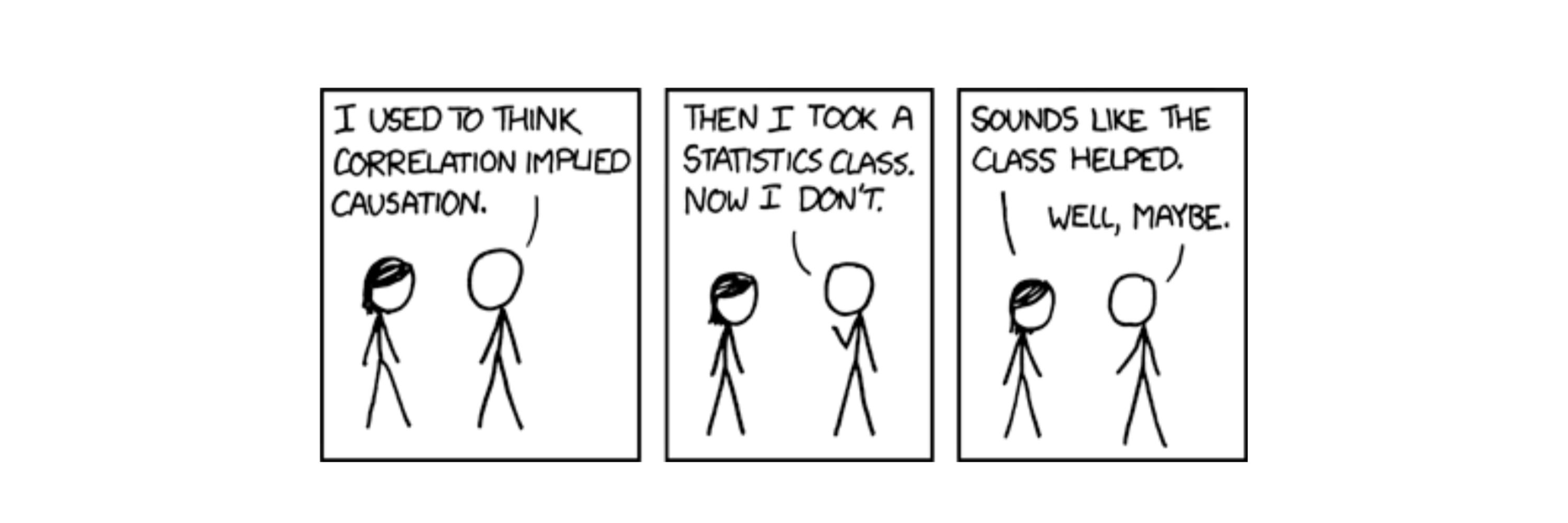
Martina Kavan
@martinakavan.bsky.social
Thinking about heat pumps, energy and decarbonisation at @nestauk.bsky.social
There are different ways to reduce levies on electricity. The last row here shows average changes in annual bill compared to today under our preferred solution:
Shifting levies from electricity to gas + moving ECO off gas bills + increasing fuel support
Shifting levies from electricity to gas + moving ECO off gas bills + increasing fuel support
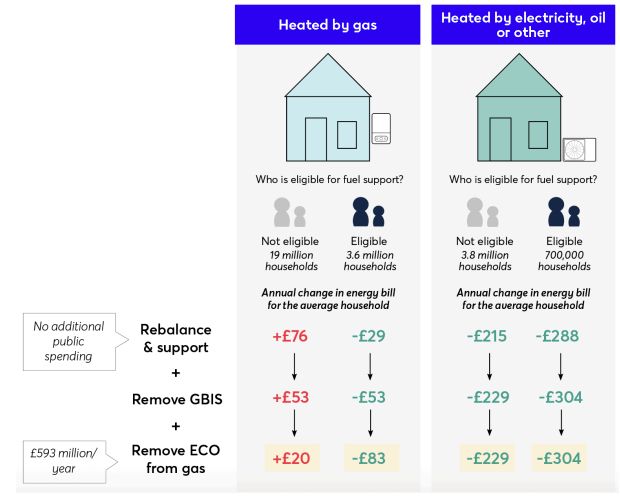
June 5, 2025 at 2:23 PM
There are different ways to reduce levies on electricity. The last row here shows average changes in annual bill compared to today under our preferred solution:
Shifting levies from electricity to gas + moving ECO off gas bills + increasing fuel support
Shifting levies from electricity to gas + moving ECO off gas bills + increasing fuel support
Government recently consulted on a new fuel poverty strategy for England. Recognizing that what they're doing now isn't making much of a dent in the problem.
Asking questions like "How should we implement the sustainability principle".
Asking questions like "How should we implement the sustainability principle".
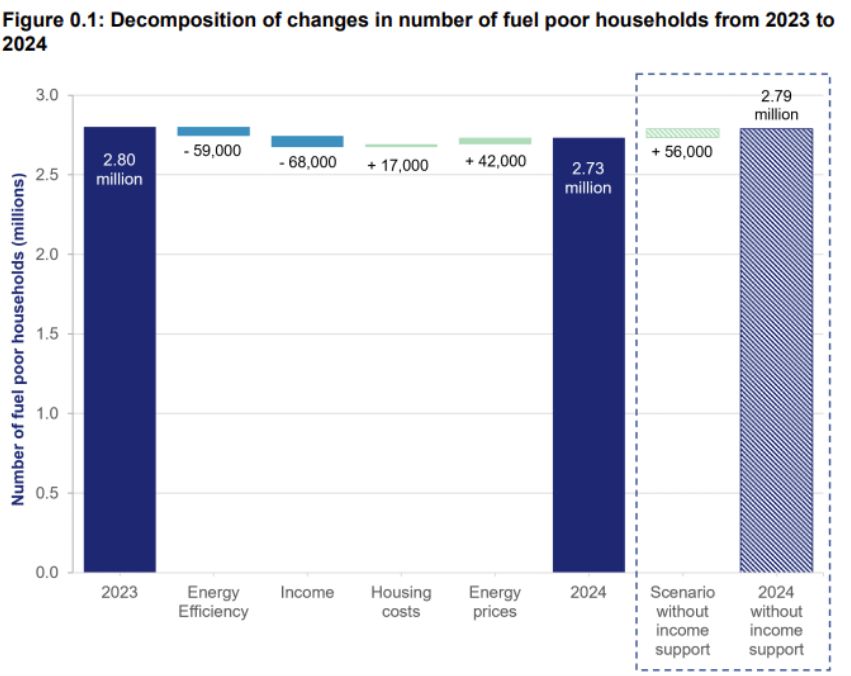
June 2, 2025 at 12:01 PM
Government recently consulted on a new fuel poverty strategy for England. Recognizing that what they're doing now isn't making much of a dent in the problem.
Asking questions like "How should we implement the sustainability principle".
Asking questions like "How should we implement the sustainability principle".
I wrote a blog on the role of electricity prices in helping people in fuel poverty.
These are two illustrative scenarios I used to describe the long-term effects of cheap/expensive electricity on public spending and fuel poverty:
🧵
These are two illustrative scenarios I used to describe the long-term effects of cheap/expensive electricity on public spending and fuel poverty:
🧵

June 2, 2025 at 12:01 PM
I wrote a blog on the role of electricity prices in helping people in fuel poverty.
These are two illustrative scenarios I used to describe the long-term effects of cheap/expensive electricity on public spending and fuel poverty:
🧵
These are two illustrative scenarios I used to describe the long-term effects of cheap/expensive electricity on public spending and fuel poverty:
🧵
Moving levies from electricity to gas would protect decarbonisation efforts from volatility in gas prices. 📉 This chart shows the future electricity-to-gas price ratio (key metric for incentivizing electrification) under wholesale price scenarios with (full lines) and without (dashed) rebalancing.
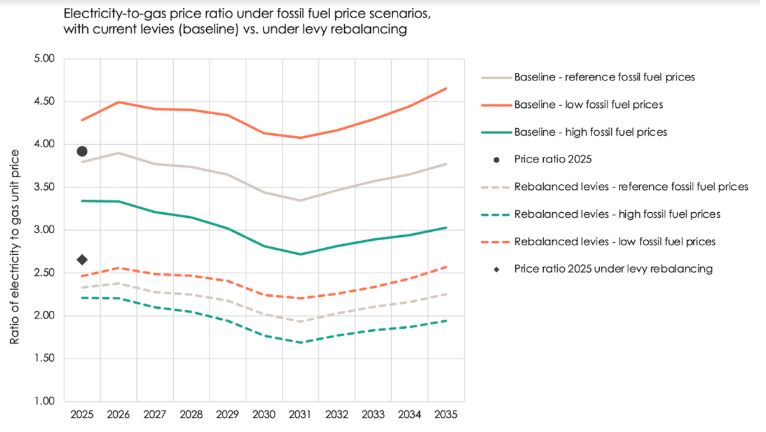
April 30, 2025 at 2:06 PM
Moving levies from electricity to gas would protect decarbonisation efforts from volatility in gas prices. 📉 This chart shows the future electricity-to-gas price ratio (key metric for incentivizing electrification) under wholesale price scenarios with (full lines) and without (dashed) rebalancing.
By 2030 without rebalancing levies, BUS would need to be at £6,000 to maintain price parity between heat pumps and boilers.
On the other hand, if levies are rebalanced, £2,000 should be enough for the average household.
(chart shows annualised costs over 15 years)
On the other hand, if levies are rebalanced, £2,000 should be enough for the average household.
(chart shows annualised costs over 15 years)
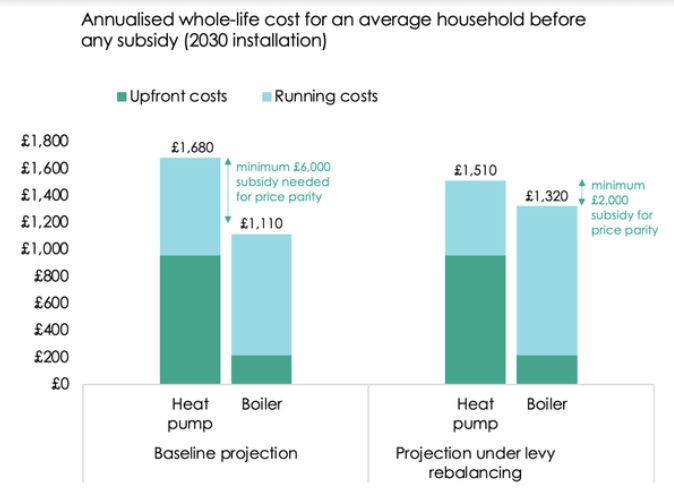
April 25, 2025 at 12:15 PM
By 2030 without rebalancing levies, BUS would need to be at £6,000 to maintain price parity between heat pumps and boilers.
On the other hand, if levies are rebalanced, £2,000 should be enough for the average household.
(chart shows annualised costs over 15 years)
On the other hand, if levies are rebalanced, £2,000 should be enough for the average household.
(chart shows annualised costs over 15 years)
Moving the majority of levies from electricity to gas bills would bring the ratio of electricity to gas prices from 3.9 to 2.7. And it would technically cost the government nothing.
Heat pump owners would pay on avg. £380/year less than households on gas, even including upfront costs and interest.
Heat pump owners would pay on avg. £380/year less than households on gas, even including upfront costs and interest.
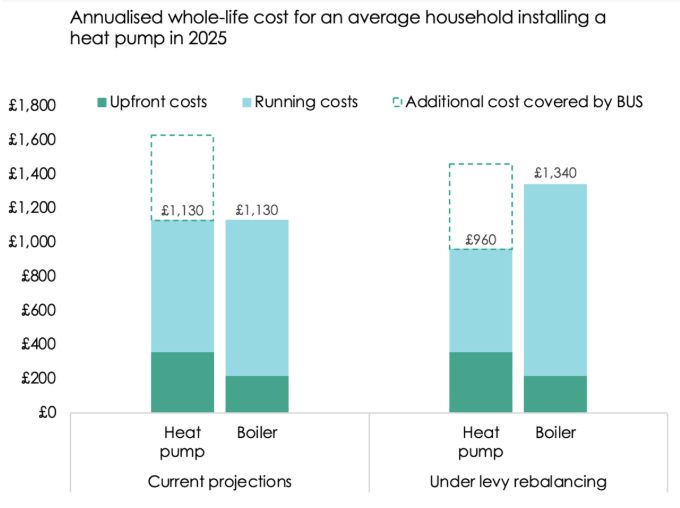
April 25, 2025 at 12:15 PM
Moving the majority of levies from electricity to gas bills would bring the ratio of electricity to gas prices from 3.9 to 2.7. And it would technically cost the government nothing.
Heat pump owners would pay on avg. £380/year less than households on gas, even including upfront costs and interest.
Heat pump owners would pay on avg. £380/year less than households on gas, even including upfront costs and interest.
Fixing electricity pricing is urgent. Without it, decarbonisation stalls and gov will need to spend billions more on subsidies.
I wrote a blog explaining the role of energy levies in the total cost of heat pumps. 🧵🔽
This chart shows the projected annual costs over 15 years under status quo:
I wrote a blog explaining the role of energy levies in the total cost of heat pumps. 🧵🔽
This chart shows the projected annual costs over 15 years under status quo:
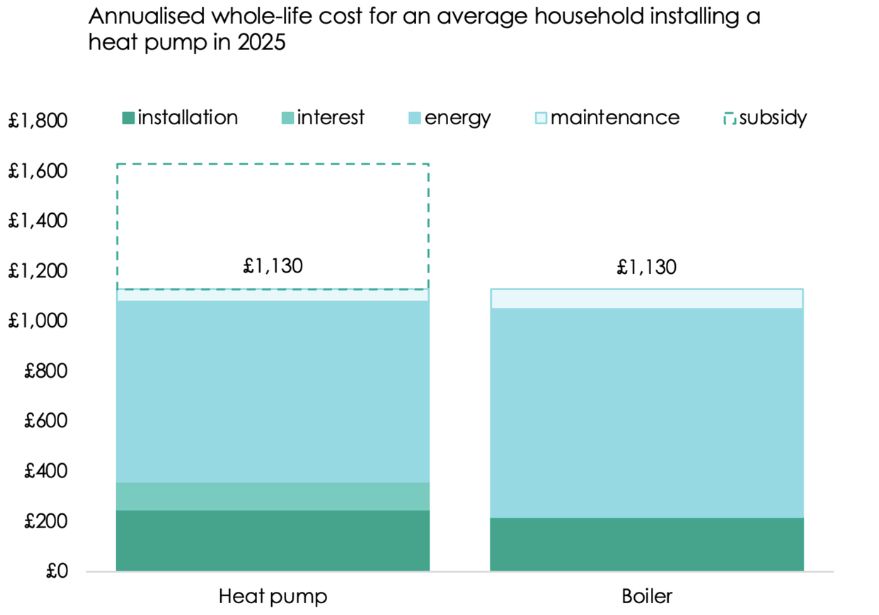
April 25, 2025 at 12:15 PM
Fixing electricity pricing is urgent. Without it, decarbonisation stalls and gov will need to spend billions more on subsidies.
I wrote a blog explaining the role of energy levies in the total cost of heat pumps. 🧵🔽
This chart shows the projected annual costs over 15 years under status quo:
I wrote a blog explaining the role of energy levies in the total cost of heat pumps. 🧵🔽
This chart shows the projected annual costs over 15 years under status quo:
Removing policy levies from electricity bills is highlighted in the mix of solutions. It would save hundreds of pounds to the 4.5 million electrically heated households, and would create a big incentive to switch to a heat pump.
( @nestauk.bsky.social chart from www.nesta.org.uk/project/find...)
( @nestauk.bsky.social chart from www.nesta.org.uk/project/find...)
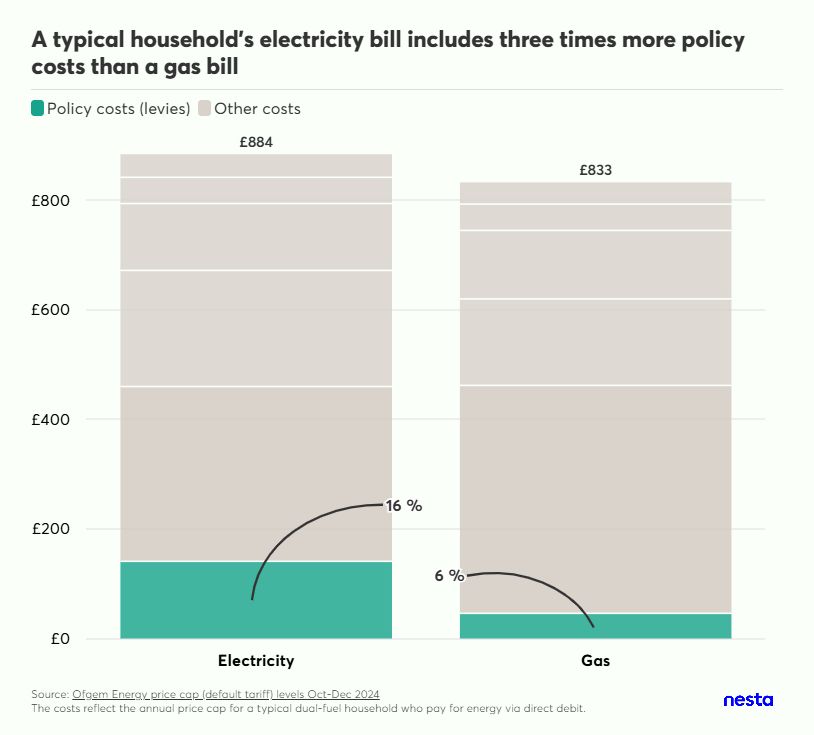
March 13, 2025 at 10:13 AM
Removing policy levies from electricity bills is highlighted in the mix of solutions. It would save hundreds of pounds to the 4.5 million electrically heated households, and would create a big incentive to switch to a heat pump.
( @nestauk.bsky.social chart from www.nesta.org.uk/project/find...)
( @nestauk.bsky.social chart from www.nesta.org.uk/project/find...)
A nice clear and simple piece from @energy-uk.org.uk: "How to cut bills".
Doing nothing on energy bills now means:
- continued levels of fuel poverty
- slow decarbonisation because of expensive electricity
- households exposed to more gas price shocks
Doing nothing on energy bills now means:
- continued levels of fuel poverty
- slow decarbonisation because of expensive electricity
- households exposed to more gas price shocks
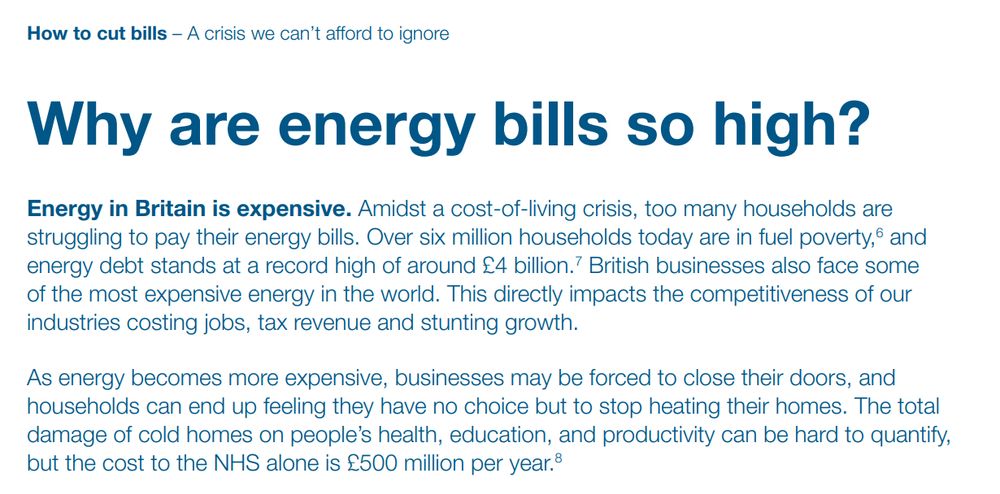
March 13, 2025 at 10:13 AM
A nice clear and simple piece from @energy-uk.org.uk: "How to cut bills".
Doing nothing on energy bills now means:
- continued levels of fuel poverty
- slow decarbonisation because of expensive electricity
- households exposed to more gas price shocks
Doing nothing on energy bills now means:
- continued levels of fuel poverty
- slow decarbonisation because of expensive electricity
- households exposed to more gas price shocks
And the big picture – electrification of heating plays a major role in CB7.
General electrification accounts for 58% of emissions reduction, and heat pumps = ¼ of that.
Unlike CB6, CB7 clearly states no role for hydrogen in heating. 75% of all clean heating should be delivered by heat pumps.
General electrification accounts for 58% of emissions reduction, and heat pumps = ¼ of that.
Unlike CB6, CB7 clearly states no role for hydrogen in heating. 75% of all clean heating should be delivered by heat pumps.
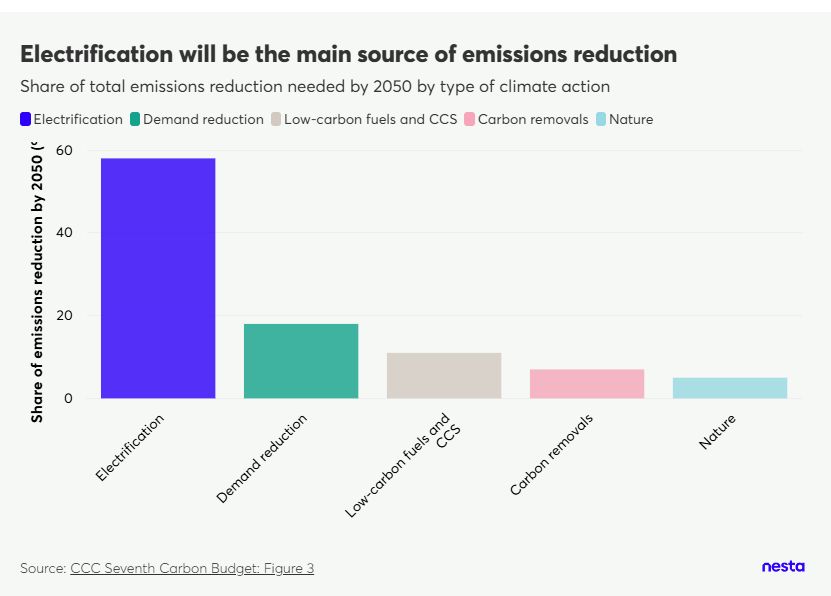
February 28, 2025 at 3:02 PM
And the big picture – electrification of heating plays a major role in CB7.
General electrification accounts for 58% of emissions reduction, and heat pumps = ¼ of that.
Unlike CB6, CB7 clearly states no role for hydrogen in heating. 75% of all clean heating should be delivered by heat pumps.
General electrification accounts for 58% of emissions reduction, and heat pumps = ¼ of that.
Unlike CB6, CB7 clearly states no role for hydrogen in heating. 75% of all clean heating should be delivered by heat pumps.
Current progress is lagging behind. Last year 100,000 heat pumps were installed, up from 60,000 the year before. So the pace is picking up, but the UK is still behind its targets and moving slower than most EU countries.
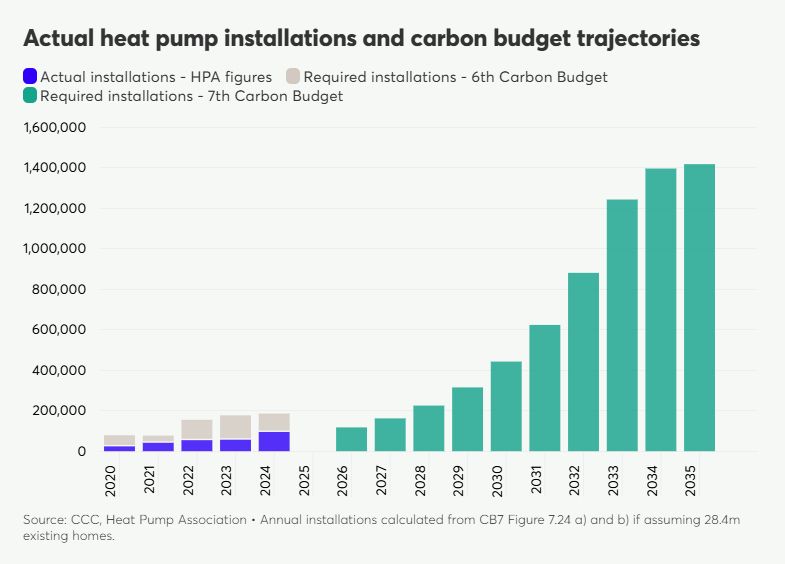
February 28, 2025 at 3:02 PM
Current progress is lagging behind. Last year 100,000 heat pumps were installed, up from 60,000 the year before. So the pace is picking up, but the UK is still behind its targets and moving slower than most EU countries.
Fresh out the CCC oven – the Seventh Carbon Budget sets out a new trajectory for heat pumps.
The new Balanced Pathway pushes back heat pump installations into the 30s – more realistic given current progress, but still ambitious.
The new Balanced Pathway pushes back heat pump installations into the 30s – more realistic given current progress, but still ambitious.

February 28, 2025 at 3:02 PM
Fresh out the CCC oven – the Seventh Carbon Budget sets out a new trajectory for heat pumps.
The new Balanced Pathway pushes back heat pump installations into the 30s – more realistic given current progress, but still ambitious.
The new Balanced Pathway pushes back heat pump installations into the 30s – more realistic given current progress, but still ambitious.
Doing something about levies would also ease the burden on households with direct electric heating who are paying disproportionately in levies.
Households with electric heating have a higher prevalence and much greater depths of fuel poverty.
See chart here: public.flourish.studio/story/2696937/
Households with electric heating have a higher prevalence and much greater depths of fuel poverty.
See chart here: public.flourish.studio/story/2696937/

December 4, 2024 at 11:18 PM
Doing something about levies would also ease the burden on households with direct electric heating who are paying disproportionately in levies.
Households with electric heating have a higher prevalence and much greater depths of fuel poverty.
See chart here: public.flourish.studio/story/2696937/
Households with electric heating have a higher prevalence and much greater depths of fuel poverty.
See chart here: public.flourish.studio/story/2696937/
Rebalancing levies (moving them to gas) would have a huge effect on the electricity-to-gas-price ratio (the "spark gap") - because electricity gets cheaper for consumers while gas gets more expensive.
A low ratio is an important ingredient in electrifying heat and moving away from fossil gas.
A low ratio is an important ingredient in electrifying heat and moving away from fossil gas.

December 4, 2024 at 11:18 PM
Rebalancing levies (moving them to gas) would have a huge effect on the electricity-to-gas-price ratio (the "spark gap") - because electricity gets cheaper for consumers while gas gets more expensive.
A low ratio is an important ingredient in electrifying heat and moving away from fossil gas.
A low ratio is an important ingredient in electrifying heat and moving away from fossil gas.
Almost £6bn was raised in levies last year. Most of this through electricity bills, collected from each unit of electricity consumed.
To make electricity cheaper, this money would either need to be raised from general taxation instead, or moved onto gas bills.
To make electricity cheaper, this money would either need to be raised from general taxation instead, or moved onto gas bills.

December 4, 2024 at 11:18 PM
Almost £6bn was raised in levies last year. Most of this through electricity bills, collected from each unit of electricity consumed.
To make electricity cheaper, this money would either need to be raised from general taxation instead, or moved onto gas bills.
To make electricity cheaper, this money would either need to be raised from general taxation instead, or moved onto gas bills.
First, what are levies? They are costs added into electricity and gas prices to pay for various social and environmental schemes.
They add ~£140 a year to an electricity bill but less than £50 to a gas bill for a typical household. An imbalance.
They add ~£140 a year to an electricity bill but less than £50 to a gas bill for a typical household. An imbalance.

December 4, 2024 at 11:18 PM
First, what are levies? They are costs added into electricity and gas prices to pay for various social and environmental schemes.
They add ~£140 a year to an electricity bill but less than £50 to a gas bill for a typical household. An imbalance.
They add ~£140 a year to an electricity bill but less than £50 to a gas bill for a typical household. An imbalance.
Ofgem and the CSE developed these helpful 24 archetypes grouping households based on their heating fuel, consumption, income and size (interactive chart in article).
We've been using them at @nestauk.bsky.social to look at how rebalancing levies on bills would affect different kinds of households.
We've been using them at @nestauk.bsky.social to look at how rebalancing levies on bills would affect different kinds of households.

November 26, 2024 at 5:59 PM
Ofgem and the CSE developed these helpful 24 archetypes grouping households based on their heating fuel, consumption, income and size (interactive chart in article).
We've been using them at @nestauk.bsky.social to look at how rebalancing levies on bills would affect different kinds of households.
We've been using them at @nestauk.bsky.social to look at how rebalancing levies on bills would affect different kinds of households.
For a rough idea of the scale of differences, here are four archetypical households and their energy bills.
Many households with direct electrical heat though also pay a lot more for energy than similar-sized households on gas. That's because electricity is currently 4 times the price of gas.
Many households with direct electrical heat though also pay a lot more for energy than similar-sized households on gas. That's because electricity is currently 4 times the price of gas.

November 26, 2024 at 5:59 PM
For a rough idea of the scale of differences, here are four archetypical households and their energy bills.
Many households with direct electrical heat though also pay a lot more for energy than similar-sized households on gas. That's because electricity is currently 4 times the price of gas.
Many households with direct electrical heat though also pay a lot more for energy than similar-sized households on gas. That's because electricity is currently 4 times the price of gas.
Ofgem announced today a new energy price cap that'll be in effect from January.
Here's a helpful explainer for anyone wanting to understand what the energy price cap is – and what our energy bills pay for:
www.nesta.org.uk/report/whats...
Here's a helpful explainer for anyone wanting to understand what the energy price cap is – and what our energy bills pay for:
www.nesta.org.uk/report/whats...

November 22, 2024 at 11:01 AM
Ofgem announced today a new energy price cap that'll be in effect from January.
Here's a helpful explainer for anyone wanting to understand what the energy price cap is – and what our energy bills pay for:
www.nesta.org.uk/report/whats...
Here's a helpful explainer for anyone wanting to understand what the energy price cap is – and what our energy bills pay for:
www.nesta.org.uk/report/whats...

